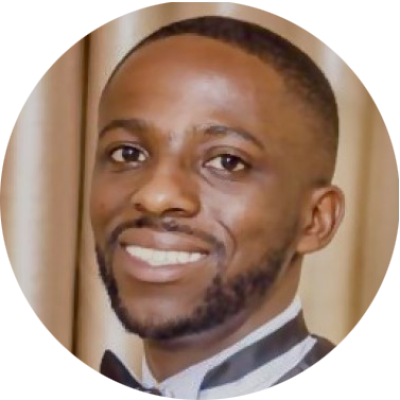
Clinton O. Ogega
My research focuses on elucidating memory B cell and antibody responses following hepatitis C virus [HCV] or SAR-CoV-2 infection. The COVID-19 pandemic has reaffirmed the importance of vaccines in containing spread of disease and preventing serious illness. To do so, many vaccines elicit memory B cells specific for the receptor binding domains, which in turn produce durable and potent broadly neutralizing antibodies [bNAbs] against the virus. Unlike SARS-CoV-2, we currently do not have an approved vaccine for HCV. There are approximately 71 million people, many asymptomatic, living with chronic HCV infection that can lead to liver failure and hepatocellular carcinoma. One of the reasons we don’t have a vaccine is because we have not determined the critical epitopes that a vaccine can target.
In the laboratory of Dr. Justin Bailey, we study how the adaptive immune system responds to HCV or SARS-CoV-2 infection with a focus on B cell/ antibody responses and their viral targets or escape mechanisms. For my thesis work, I developed a highly specific and sensitive method that captures HCV specific B cells. For the first portion of the project, I characterized memory B cells that are associated with low antibody levels during HCV infection. I found that plasma anti-HCV antibody levels were positively correlated with frequencies of resting and activated memory B cells. Additionally, anti-HCV antibody levels were negatively correlated with levels of the expression of FCRL5 on resting and PD-1 on activated memory B cells. For the second portion of the project, I isolated and characterized 55 cross-reactive HCV specific bNAbs from an elite HCV neutralizer who naturally cleared three infections. We discovered that HCV specific bNAbs use a wide range of antibody gene segments and they acquire similar mutations that are critical for binding to the virus, pointing to convergent co-evolution of multiple bNAb lineages. Epitope mapping and crystal structures revealed that HCV bNAbs target conserved and undescribed epitopes on the virus. These findings show which epitopes are critical for bNAbs to target on an HCV virion — important information in the development of an HCV vaccine.
Questions & Answers
Why did you choose Johns Hopkins for your work? The Johns Hopkins University School of Medicine was my first choice for graduate school. I’m a Hopkins lifer, having attended the Homewood campus for my undergraduate degree. While in my bachelor’s studies, I got exposed to the research at the school of medicine and worked in a tuberculosis lab. I was impressed that Hopkins offered a wide variety of research labs that are led by experts in their fields. When I was thinking about graduate school, my goal was to do clinical infectious disease research, something I knew Hopkins was a leader in. It was for this reason that I chose the Johns Hopkins University School of Medicine to pursue my Ph.D. What does receiving this award mean to you personally and professionally? Do you have any connection with the particular award you received? Winning the Alicia Showalter Reynolds Research Award means a lot to me, as it validates and recognizes my research efforts as a young investigator. It means even more because, just like Alicia Showalter Reynolds, I too was a graduate student in the Department of Pharmacology and Molecular Sciences. Alicia Showalter Reynolds was a Ph.D. candidate in 1996 when she was abducted and murdered, and no suspect has been found. Hence, it is an honor to receive this award named after her, as it honors her memory as a graduate student. What contributed to your project’s success? (Special skills, interests, opportunities, guidance, etc.) I attribute my project’s success to having great mentors and collaborators. I learned how to be an effective and productive investigator under the guidance of Justin Bailey, who is just as hard working, driven and scientifically curious as I am. The Bailey laboratory is part of the viral hepatitis center, where I had the privilege of working alongside spectacular hepatitis b virus [HBV], hepatitis c virus [HCV], HIV and SARS-CoV-2 clinical immunology experts, with a co-mentorship of Stuart Ray. Finally, I was surrounded with amazing collaborators in other Johns Hopkins Medicine departments and at Caltech [California Institute of Technology] and Vanderbilt. What thoughts do you have about Young Investigators’ Day itself, as a celebration of the roles students and fellows play in research at Hopkins? Young Investigators’ Day is a crucial part of the science training at Hopkins. It offers an avenue of recognizing the hard work that many exceptional trainees are engaged in, some who might have been overlooked for their contributions. It means even more as the winners are decided by a panel of faculty members. What has been your best/most memorable experience while at Hopkins? From the classes to laboratory work, I have had the privilege of being surrounded with impeccable and scientifically ambitious colleagues and faculty members who always made me feel challenged and never lacked ideas. Along this training journey, I have made lifelong friends and future collaborators. These are my most memorable memories at Hopkins. What are your plans over the next year or so? Graduating, looking for faculty positions, etc.? I defended my thesis at the end of January 2022 and I just recently started work as a scientist in antigen design and selection at Moderna. I hope to keep working in infectious disease vaccine development efforts for years to come. Tell me something interesting about yourself that makes you unique. Do you have any special hobbies, interests or life experiences? I spend too much time on soccer. I have been a lifelong Manchester United fan and most of my weekends are usually spent watching them play, when they have a game. I have also spent a lot of time playing in many Volo and Charm City soccer leagues around Baltimore. Soccer and running around the promenade have been a great avenue out of science when needed.